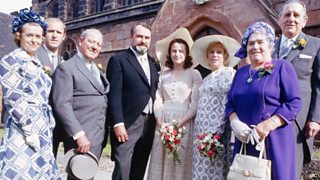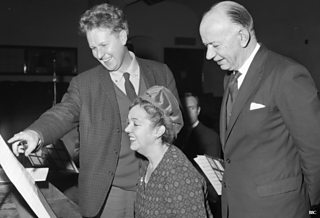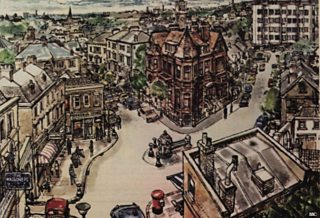
Some of the Archers (Dan and Doris on the right) dolled up for a 1971 wedding in Ambridge
Soap opera, so called because the early examples in the US were sponsored by soap powder companies, are a staple of broadcasting.
While the exact definition of a is hard to pin down, it tends to be the sort of thing that you know when you see (or hear) it. It can of course be used pejoratively if a non-soap series is seen to be spending too much time exploring people’s domestic entanglements, but soaps have been rightly praised for highlighting issues in society – such as the recent domestic abuse storyline in The Archers.
Unsurprisingly, the earliest continuing dramas on the �������� were on radio. The whole practice of episodic fiction can be traced back to the publication of novels by Dickens as partworks in the 19th Century, where readers would eagerly await the next instalment of each story. When Dickens’ works were they were already structured to lend easily to episodic production.
The idea of the same characters appearing in successive stories also owes something to literature, with writers like Sir Arthur Conan Doyle and his tales. Radio’s early recurring heroes included the likes of Francis Durbridge’s classic hero , but these were episodic thrillers, not soaps.
The first programme that can be called a soap on the �������� was Front-Line Family, which was broadcast to the USA on the �������� Overseas Service from 1941. Post-war, it was also heard at home on the Light Programme, now under the title . The series was intended to make American listeners empathise with the plight of the British public, and did so in a way that was familiar in the States - though �������� executives were extremely sniffy about the lowering of standards involved in creating a popular series, and derisive of the intellect of their intended audience.
One of the first great serial hits on radio after the war was , a fairly lurid thriller series, concerning the daring adventures of Barton and his sidekicks Jock and Snowy, and any number of foreign spies and Nazis and scientists being kidnapped.
When this series ended it was replaced by something described at the time as a ‘farming Dick Barton’, complete with cliffhangers to entice listeners back for the next episode. That show was of course , which has been entertaining the nation for the last 65 years and shows no sign of going away.

TV's theme tune maestro Ron Grainer composed a new signature tune for The Dales in 1964 - here he is with Mrs Dale (Jessie Matthews) and Dr Dale (Charles Simon)
The Archers has had various shake-ups over the years by new editors. One if its most famous ‘stunt’ episodes was in 1955 when was killed off in a fire the same night as ITV launched. The show’s long lifespan has meant that a huge saga with many characters has unfolded before listeners, though based around the central family of the eponymous Archers.
For many years this family was headed by Dan and Doris Archer. Dan was played by four actors over the life of the serial - Harry Oakes, , and – while Doris was always played by Gwen Berryman. The series has since featured not only their children, but grandchildren and great-grandchildren. As well as a large cast of regulars (around 60, though with less than half tending to appear in any given week), the Archers is also notable for having a number of ‘silent’ characters – characters who are mentioned but have never appeared, or only occasionally. One, Pru Forrest, made a brief audible appearance in the in 1989, when she was played by Judi Dench (and interviewed by Terry Wogan).
Each episode is introduced by the theme tune Barwick Green, and to date there have been something in the region of 18,000 instalments. After a trial run in 1950 the series started fully in 1951, and now has six weekly episodes. The setting is the fictional village of Ambridge and surrounding countryside, especially the Archer homestead of Brookfield, in the equally fictitious county of Borsetshire (somewhere south of Birmingham, where the show is produced).
In its early days, The Archers had an avowedly informational slant, with Ministry of Agriculture advice woven into the stories, but although such involvement ended in the early 70s the show has continued to raise issues relevant to rural life, although some have criticised it for being a bit too near the knuckle. When radio was the majority medium, The Archers gained huge listening figures, and while the numbers are less now, it is still capable of arousing passions and getting into the headlines, while remaining a (more or less) everyday story of country folk.
The Archers was actually predated by another daily serial, , which began on the Light Programme on 5 January 1948, about the wife of a GP, Doctor Dale, and the people she came in contact with. Much parodied for its cosy atmosphere, this ran for 21 years, with various writers including Ted Willis (who once tried to kill off most of the characters in a ) coming up with five new episodes every week.
There was controversy when lead actor Ellis Powell was sacked in 1963, and replaced by former film star – but the �������� made various attempts to give it a less comfortable image, including changing the title to The Dales in 1962. Like The Archers, Mrs Dale’s Diary/The Dales was used to introduce public information messages, and was also one of the first dramas to mention the subject of homosexuality.

Robert Micklewright's superb drawing illustrates a feature on the first episode of Waggoners' Walk in 1969.
When The Dales came to an end, it was immediately replaced by a new serial on Radio 2, (originally Waggoners’ Walk NW). This was set in North West London (near Belsize Park), and concerned the inhabitants of this urban ‘village’, especially those living at No.1 Waggoners’ Walk, a town house converted into flats. The serial was to run for a little more than a decade before being dropped in a round of spending cuts in 1980. It was co-created by Jill Hyem who went on to be one of the main writers of Tenko.
Subsequently radio has struggled to come up with a successful sister soap to The Archers, while that programme has maintained its loyal following. Radio 4 did attempt another show, , from 1987 to 1991, but this twice-weekly flat-sharing soap never quite gained momentum and was dropped after nearly 400 episodes.
Other parts of the �������� have come up with their own contributions to the genre. As with Pobol y Cwm, the Welsh language television soap opera that has run since 1974, there was also a radio soap in Welsh, Station Road, which ran for a few years from the late 1990s.
The �������� World Service had its own soap, , which ran from 1997 to 2005 (latterly also on Radio 4) and centred around a health centre close to the eponymous main road from London to the West Country.
was a soap which ran from 2004 to 2010 on the �������� Asian Network, and featured the lives of a south Asian community in an unspecified area of Britain. The ten-minute episodes were presented within other programmes on the network, and budget cuts saw them reduced in length to five minutes later on, before the series was cancelled.
�������� Wiltshire Sound (the former name for �������� Wiltshire) earned a place in the record books for its unique soap Acrebury, in which all the characters were played by actor/presenter Gerry Hughes.
It’s ironic that radio has not had more successful soap operas, since producing radio drama is logistically far easier than television drama. However, the pressure on writers to come up with enough plotlines and scripts to satisfy these long-running productions is intense, and radio audiences can be particularly demanding, if fiercely loyal when they do latch onto a programme.
Who knows whether there will ever be another radio soap opera to rival the huge following that The Archers has amassed over its six and a half decades of life. We have a kind of love/hate relationship with soap, but they are now firmly part of the national fabric, both those on television, and those that reside on the original home of British soap opera, the radio.
Let us know what you think of soaps on radio , now and in the past. Are radio soaps better than those on television? Are they becoming too influenced by television’s more sensational values?
